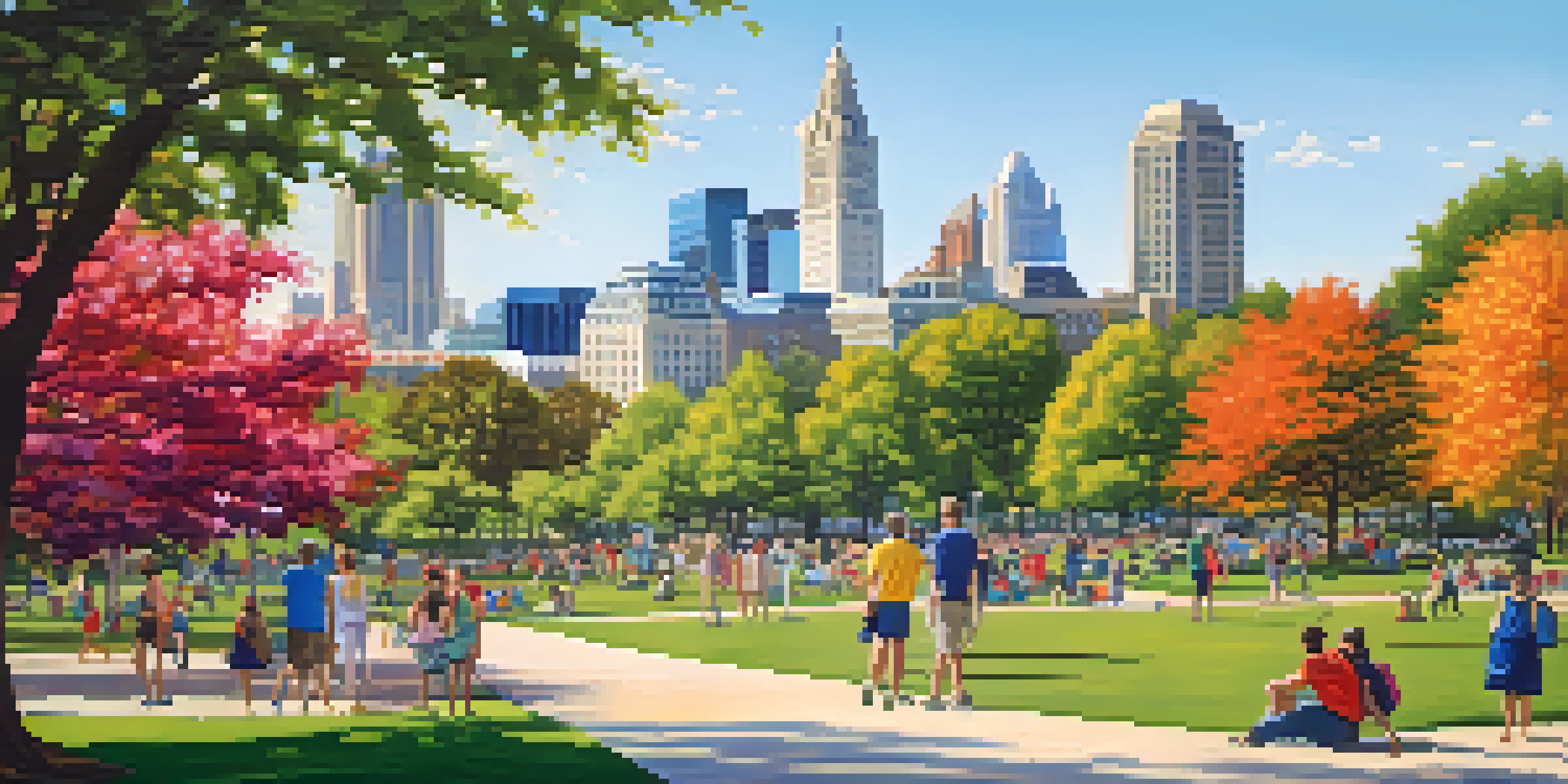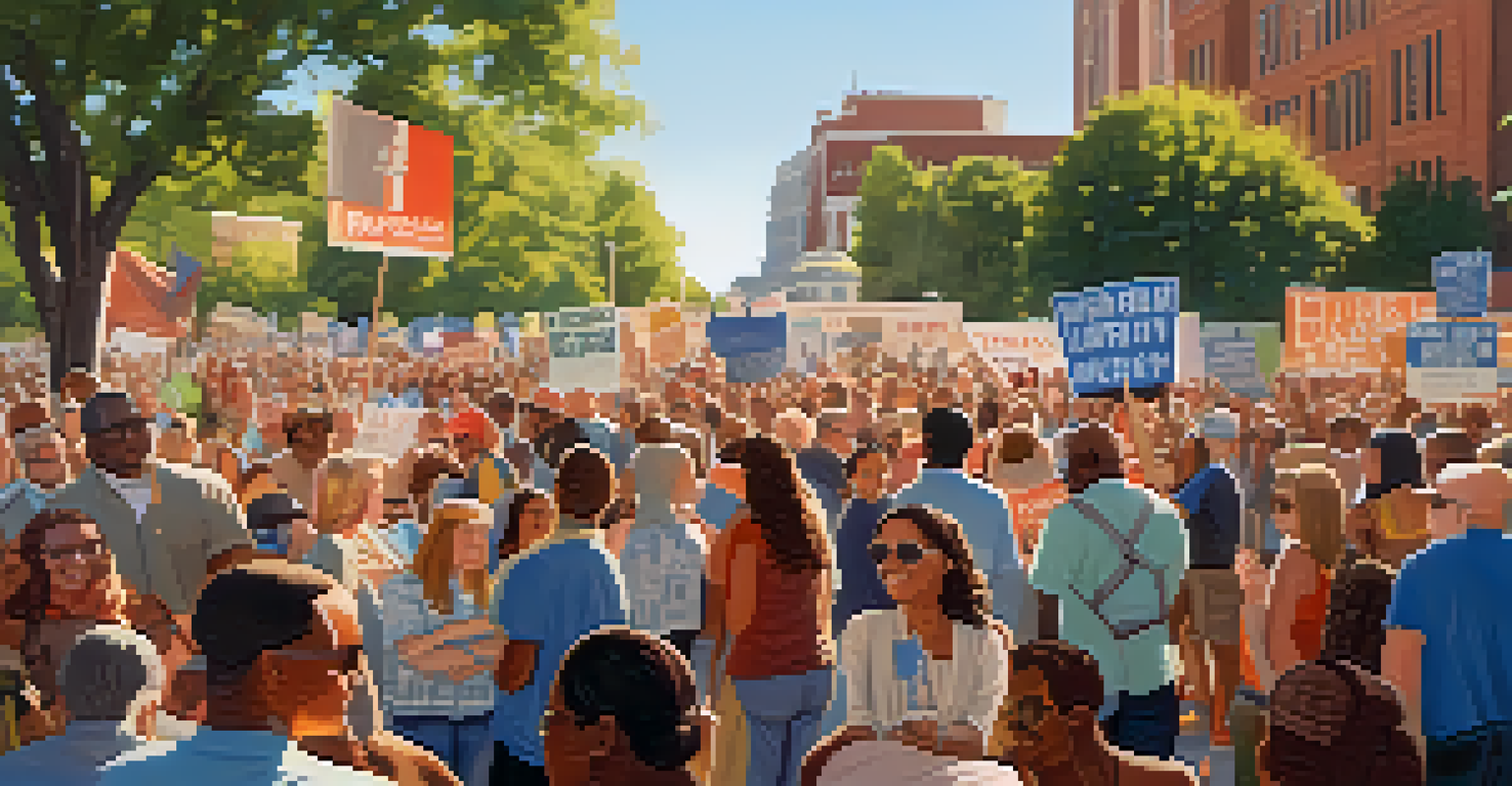Political Parties in Raleigh: Influence on Local Governance

Understanding Raleigh's Political Landscape
Raleigh, the capital of North Carolina, is a vibrant city with a rich political history. The city's political landscape is primarily dominated by two major parties: the Democrats and the Republicans. Each party brings its unique values and policies to the table, influencing local governance in various ways. Understanding this landscape is essential for grasping how decisions are made in the city.
In a democracy, the people get the government they deserve.
In addition to the two major parties, Raleigh also has a presence of third parties and independents. These groups often advocate for specific issues, adding diversity to the political discourse. For instance, issues like environmental sustainability or social justice can find representation through these alternative voices. This creates a dynamic environment where multiple perspectives can be heard.
As political parties continue to evolve, so does their impact on local governance. The changing demographics of Raleigh, including an influx of younger residents and diverse communities, shape party platforms and priorities. This evolution makes it crucial for residents to stay informed about local political developments and party influences.
The Role of Political Parties in Local Elections
Political parties play a vital role in local elections, acting as the backbone for candidate support and voter mobilization. They provide resources such as funding, volunteers, and organizational structure, which are essential for running successful campaigns. In Raleigh, this support often determines which candidates gain visibility and traction among voters.

Local elections often see candidates aligning themselves with a party to harness its established voter base. For example, a Democratic candidate may emphasize progressive policies that resonate with urban voters, while a Republican candidate might focus on fiscal conservatism appealing to suburban constituents. This alignment affects how issues are prioritized in local governance.
Raleigh's Political Diversity
Raleigh's political landscape features a mix of Democrats, Republicans, and third parties, enriching local governance with varied perspectives.
Voter turnout is significantly influenced by party initiatives. Political parties in Raleigh often host events, rallies, and outreach programs aimed at educating and energizing the electorate. This engagement is crucial, as it not only increases voter participation but also ensures that party values and platforms are clearly communicated to the public.
Party Platforms and Local Policy Decisions
The platforms of political parties directly influence local policy decisions. In Raleigh, for instance, the Democratic Party may advocate for affordable housing initiatives, while the Republican Party might prioritize tax incentives for businesses. These differing priorities reflect the overarching philosophies of each party, shaping the city’s development.
Politics is not a game. It is an earnest business.
When local government bodies are predominantly controlled by one party, the likelihood of passing legislation that aligns with that party's platform increases. This can lead to significant changes in areas such as education, public safety, and infrastructure. Consequently, residents may experience the tangible effects of these policies in their daily lives.
Moreover, party platforms can evolve over time, responding to the changing needs and desires of the community. Raleigh's political parties often engage with constituents to reassess their positions on key issues. This adaptability helps ensure that local governance remains relevant and responsive to the public's needs.
Grassroots Movements and Party Influence
Grassroots movements often emerge as a response to specific local issues, and they can significantly influence political parties in Raleigh. These movements are typically driven by community members who advocate for change on pressing matters like environmental protection or social equity. Their grassroots nature allows for a direct channel of communication between the populace and political entities.
Political parties may adopt the goals of successful grassroots movements to align with public sentiment. For instance, a movement advocating for better public transportation may prompt the Democratic Party to incorporate this into their platform. This collaboration can lead to more comprehensive and community-driven policy solutions.
Influence of Grassroots Movements
Grassroots movements in Raleigh play a crucial role in shaping party platforms and encouraging community-driven policy initiatives.
Additionally, grassroots movements can empower individuals within the party to rise through the ranks and effect change from within. When party members actively participate in grassroots initiatives, they can bring fresh perspectives and ideas to the political discourse, ultimately enriching local governance.
The Impact of Political Parties on Community Engagement
Political parties can significantly affect community engagement levels in Raleigh. By organizing events, forums, and discussions, parties create opportunities for residents to voice their concerns and participate in civic life. This engagement is crucial for fostering a sense of community and ensuring that diverse voices are heard in local governance.
Moreover, parties often serve as a platform for political education. Through outreach efforts, they inform residents about the importance of local elections, issues at stake, and how to get involved. This educational component not only empowers citizens but also cultivates a more informed electorate that can make decisions beneficial for the community.
However, the nature of engagement can vary between parties. Some may focus on mobilizing their base, while others might prioritize outreach to underrepresented groups. The effectiveness of these strategies can ultimately determine how well the community engages with local governance.
Challenges Faced by Political Parties in Raleigh
Political parties in Raleigh face several challenges that can impact their effectiveness in local governance. One significant hurdle is the increasing polarization of politics, which can create division among constituents. This polarization often leads to a lack of cooperation between parties, hindering the ability to address pressing local issues collaboratively.
Additionally, the rise of social media has transformed the political landscape, allowing for rapid dissemination of information and misinformation alike. Political parties must navigate this complex environment to engage their audiences effectively. Misleading information can undermine public trust and complicate party messaging, making it essential for parties to maintain transparency.
Challenges for Local Political Parties
Political parties in Raleigh face challenges like polarization and misinformation, which complicate their ability to engage effectively with constituents.
Finally, the changing demographics of Raleigh present both opportunities and challenges. As the city becomes more diverse, political parties must adapt their platforms to resonate with a broader audience. This adaptation may require reevaluating traditional party ideologies and finding common ground to ensure inclusive governance.
The Future of Political Parties in Raleigh
Looking ahead, the future of political parties in Raleigh will likely be shaped by ongoing changes in demographics, technology, and public sentiment. As younger generations become more politically active, parties will need to engage with them on platforms they are comfortable with, such as social media. This engagement will be crucial for ensuring continued relevance in a rapidly changing political landscape.
Moreover, the increasing importance of local issues—such as climate change, health care, and education—will necessitate that parties adapt their platforms accordingly. By focusing on the needs and desires of the community, political parties can better serve their constituents and foster stronger connections.

Ultimately, the effectiveness of political parties in Raleigh will depend on their ability to unite diverse voices and foster collaboration. By prioritizing inclusivity and responsiveness, parties can play a pivotal role in shaping the future of local governance and ensuring that all residents have a stake in the political process.